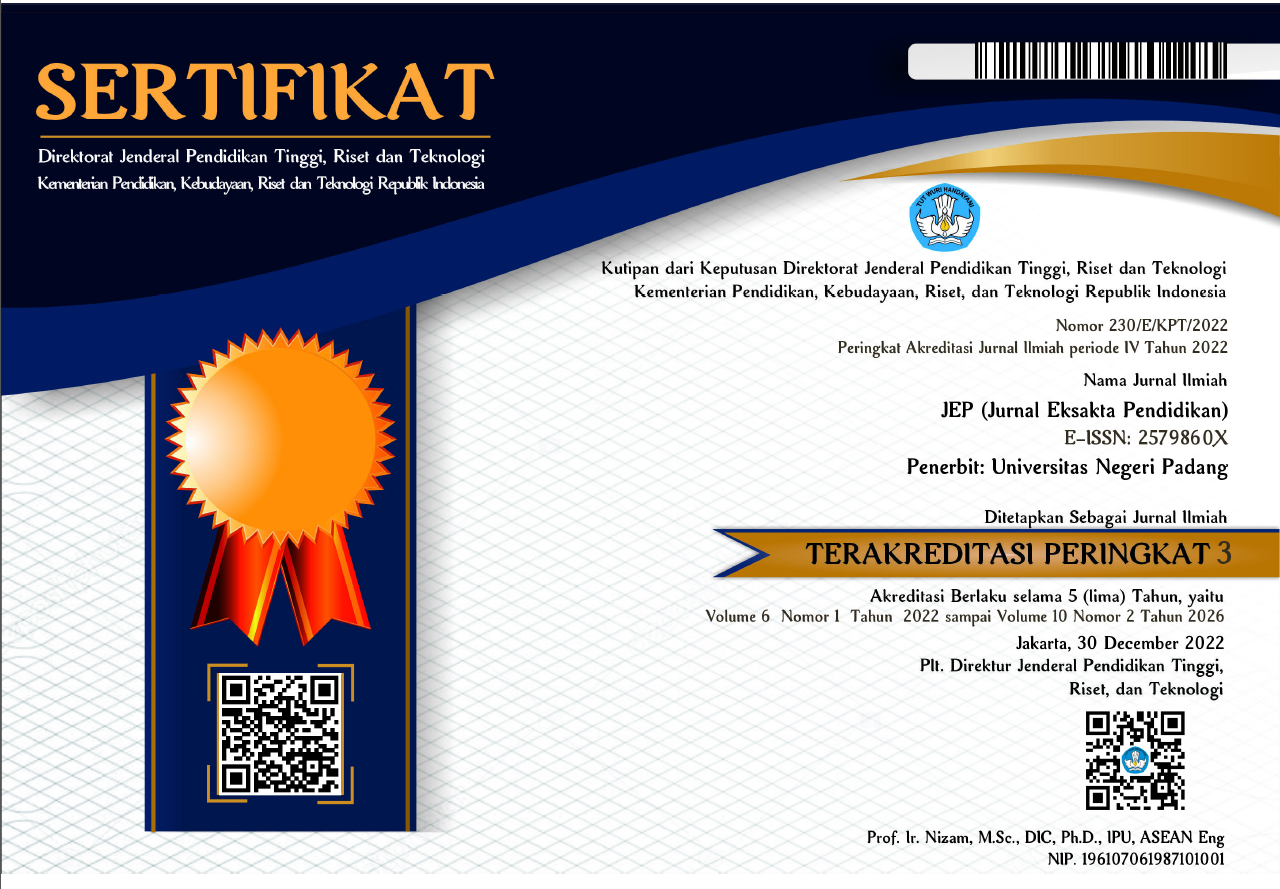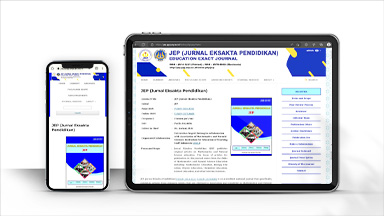Analisa Terhadap Kemampuan Penalaran Aljabar Dan Math Anxiety Antara Siswa yang Mengikuti Pembelajaran 7E Learning Cycle dan Concept Attainment
Abstract
Algebraic reasoning is one of mathematics ability that becomes goal of mathematics learning and to gain that goal, teachers need to cope the hindrance such as math anxiety. The objective of study is to analyze the attainment and escalation of algebraic reasoning in students who studied through 7E Learning Cycle and Concept Attainment, based on learning model and prior mathematical ability, in term of overall and in each class, along with math anxiety of students. The method is quasi-experimental pre-test-post-test-two-treatment designs. The samples were seventh grade junior high school students in Bandung that were consist of two classes with 40 students in 7E Learning Cycle class and 38 students in Concept Attainment class. Research’s result shows that there no significance difference of the attainment and escalation of algebraic reasoning in two experiment class based on learning model and category of early mathematical ability. But there is significance difference of the escalation of algebraic reasoning based on category of early mathematical ability in each experiment class. Besides, there is found that students have math anxiety when facing mathematics’ evaluation and tasks; and when math is involved to their future.
Downloads
References
Blackwell, L. S., Trzesniewski, K. H., & Dweck, C. S. (2007). Implicit Theorities of Intelligence Predict Achivement Across an Adolescent Transition: A Longitudinal Study and an Intervention. Child Development, 78(1), 246-263
Cohen, L., Manion, L., & Morrison, K. (2007). Research Methods in Education. New York: Routledge.
Freeman, S., dkk. (2013). Active Learning Increases Students Performance in Science, Engineering and Mathematics. Proceeding of the National Academy of Sciences, 111(23), 8410-8415.
Freeman, S., dkk. (2013). Active Learning Increases Students Performance in Science, Engineering and Mathematics. Proceeding of the National Academy of Sciences, 111(23), 8410-8415.
Gottfredson, L. (1997). Mainstream Science on Intelligence: An Editorial With 52 Signatories, History and Bibliography, Intelligence, 24, 13-23.
Hailikari, T., Nevgi, A. & Komulainen, E. (2008). Academic Self-Beliefs and Prior Knowledge as Predictors of Students Achievement in Mathematics: A Struc tural Model. Educational Psychology Journal, 28(1), 59-71.
Joyce, B, & Weil, M. (2004). Models of Teaching (7th ed.). Toronto, ON: Pearson Education.
Kaput, J. J. (2000). Transforming Algebra from an Engine of Inequity to an Engine of Mathematical Power by Algebrafying the K-12 Curriculum. Washington DC: Educational Research and Improvement.
Kaput, J., & Blanton, M. (2005). Algebrafying the Elementary Mathematics Experience in a teacher-centered, systematic way. In T.A. Romberg, T.P. Carpenter, & F. Dremock (Eds.), Understanding Mathe matics and Sciences Matters. Mahwah, NJ: Lawrence Erlbaum Associates.
Karimi, A. & Venkatesan, S. (2009). Mathe matics Anxiety, Mathematics Perfor mance and Academic Hardiness in High School Students. International Journal of Education and Sciences. 1(1): 33-37.
Mason, J. (1996). Expressing Generality and Roots of Algebra. In N. Bednarz, C. Kieran, & L. Lee (Eds.), Approaches to Algebra: Perspectives for Research and Teaching (pp. 65–86). Dordrecht, Netherlands: Kluwer Academic Publi shers.
Michael, J. (2006). Where’s The Evidence That Active Learning Works?. Advance in Physiology Education, 30, 159-167.
Mulligan, J., Cavanagh, M. & Brown, D. K. (2012). The Role of Algebra and Early Algebraic Reasoning in the Australian Curriculum: Mathematics. Mathematics Education Research Group of Australia, 47-70.
NCTM. (2000a). Curriculum and Evaluation Standards for School Mathema tics.Reston, VA : The Council.
NCTM. (2000b). Principles and Standards for School Mathematics.Reston, VA : The Council.
Ontario Ministry of Education. (2013). Paying Attention to Algebraic Reasoning. Toronto: Queen’s Printer.
Panasuk, R. M. (2010). Three Phase Ranking Framework For Assessing Conceptual Understanding In Algebra Using Multiple Representations. Education Vol.131 No. 2 : Project Innovation, Inc.
Ramirez, G., dkk. (2013). Math Anxiety, Working Memory, and Math Achieve ment in Early Elementary School. Journal of Cognition and Development. 14 (2), 187-202.
Republik Indonesia. (2005). Undang-Undang No. 22 Tahun 2006 Tentang Standar Isi. Lembaran Negara RI Tahun 2005. Sekretariat Negara. Jakarta.
Slavin, R. E. (2010). Cooperative Learning: Teori, Riset dan Praktik. Bandung: Nusa Media.
Spicer, J. (2004). Resources To Combat Math Anxiety. Eisenhower National Clearinghouse Focus 12(12).
Sugiyono. (2012). Metode Penelitian Kuantitatif, Kualitatif dan R&D. Bandung: Alfabetha.
Tobias, S. (1993). Overcoming Math Anxiety. New York: W.W. Norton & Company.
Van de Walle, J. A., Karp, K., & Bay-Williams, J. (2011). Elementary And Middle School Mathematics: Teaching Developmentally. Boston, MA: Allyn & Bacon.
Von Glasersfeld (2000). Problem of Constructivism. London: Routledge Falmer.
Vygotsky, L. (1978). Interaction Between Learning and Development. From: Mind and Society (pp.79-91), Harvard University Press.
Wigfield, A. & Meece, J. L. (1988). Math Anxiety in Elementary and Secondary School Students. Journal of Educational Psychology, 80(2), 210-216.
Copyright (c) 2022 Khairani Khairani, Wahyudin Wahyudin, Endang Cahya

This work is licensed under a Creative Commons Attribution 4.0 International License.

This work is licensed under a Creative Commons Attribution 4.0 International License.




_(2579-860X).png)
_(2614-1221)1.png)




